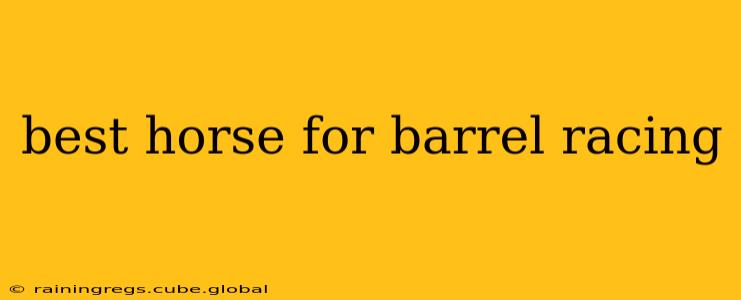Barrel racing demands a unique blend of athleticism, agility, and temperament in a horse. There's no single "best" breed, but rather a combination of traits that make a horse excel in this fast-paced sport. This guide explores the ideal characteristics, common breeds used, and factors to consider when searching for your perfect barrel racing partner.
What Makes a Great Barrel Racing Horse?
A top barrel racing horse possesses several key attributes:
- Speed and Acceleration: This is paramount. The horse needs to be able to explode out of the gate and maintain a high speed throughout the run.
- Agility and Quick Turns: Sharp, controlled turns are crucial for minimizing time loss. A horse must be nimble and able to change direction rapidly without sacrificing speed or balance.
- Athletic Build: A compact, muscular build with strong legs and a short, powerful back is ideal for quick acceleration and maneuverability.
- Soundness: Barrel racing is physically demanding. A horse's soundness and overall health are critical for longevity in the sport. Any pre-existing injuries or weaknesses can significantly impact their performance and career.
- Temperament: A calm, confident, and responsive horse is essential. A nervous or easily spooked horse will struggle under the pressure of competition. The ideal horse is brave, willing, and enjoys the sport.
Popular Breeds for Barrel Racing
While any horse can barrel race, certain breeds are frequently chosen for their inherent strengths:
- Quarter Horses: Known for their incredible acceleration, agility, and compact build, Quarter Horses are by far the most popular breed in barrel racing. Their athleticism and responsiveness make them exceptionally well-suited to the demands of the sport.
- American Paint Horses: These horses often combine the athleticism of Quarter Horses with striking coat patterns. They frequently compete successfully at high levels.
- Appaloosas: Appaloosas, known for their distinctive spotted coats, also demonstrate excellent athleticism and agility, making them suitable for barrel racing.
- Thoroughbreds: While less common than Quarter Horses, Thoroughbreds can excel in barrel racing due to their inherent speed. However, their temperament often requires more experienced handling.
What Size Horse is Best for Barrel Racing?
There's no single "perfect" size. However, many successful barrel racers prefer horses that are between 14.2 and 15.2 hands high. This height provides a good balance of speed, agility, and maneuverability. Smaller horses might struggle with the power needed for quick turns, while larger horses can sometimes lack agility.
What are the Common Injuries in Barrel Racing Horses?
Barrel racing puts significant strain on a horse's musculoskeletal system. Common injuries include:
- Leg Injuries: Stress fractures, strains, and sprains are frequent, often occurring in the legs and fetlocks due to the intense turning and acceleration.
- Back Injuries: The powerful turns and quick changes in direction can lead to back problems.
- Shoulder Injuries: Shoulder injuries can be caused by the repetitive stress of turning.
How Much Does a Barrel Racing Horse Cost?
The cost of a barrel racing horse varies dramatically depending on the horse's age, training level, pedigree, and performance record. A well-trained, proven barrel racing horse can cost tens of thousands of dollars, while a younger, less experienced horse may be available for a considerably lower price.
How Do I Find the Right Barrel Racing Horse for Me?
Finding the right horse is a significant undertaking. Consider these factors:
- Your Riding Skill: Choose a horse whose training level matches your abilities.
- Your Budget: Set a realistic budget that encompasses the purchase price, training, veterinary care, and equipment.
- Your Goals: Are you aiming for local competitions or national-level events? This will influence the type of horse you need.
- Seek Professional Guidance: Don't hesitate to consult with experienced barrel racers or trainers for advice.
Finding the perfect barrel racing horse is a journey, requiring patience, research, and a discerning eye. By understanding the ideal characteristics and considering your own skills and goals, you can increase your chances of finding a true partner who will share your passion for the sport. Remember, the best horse isn't just about speed and agility – it’s about finding a reliable, willing, and trustworthy companion.
